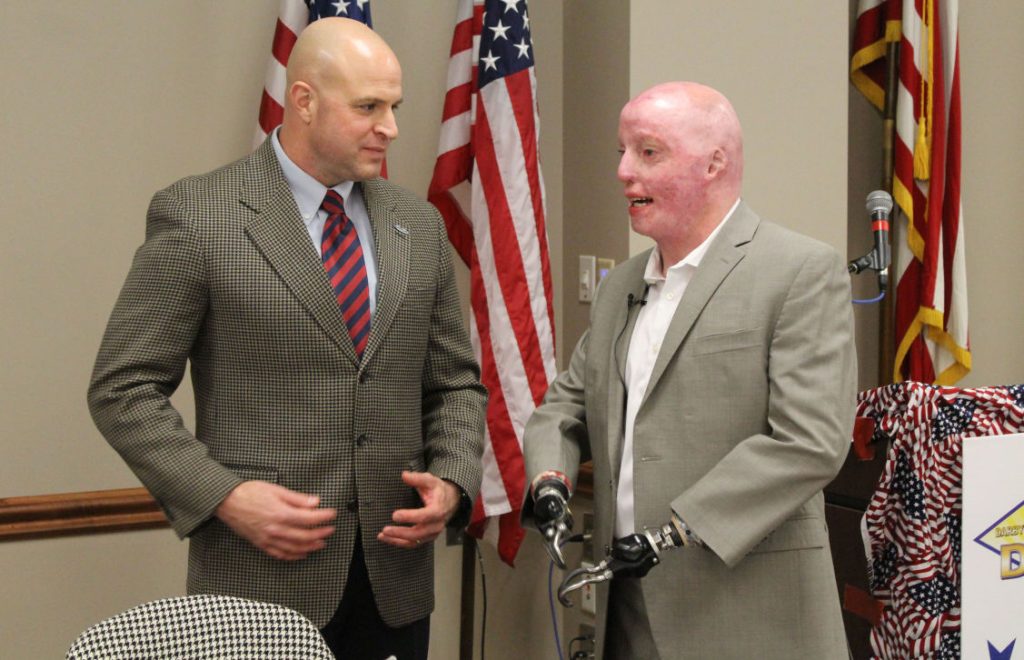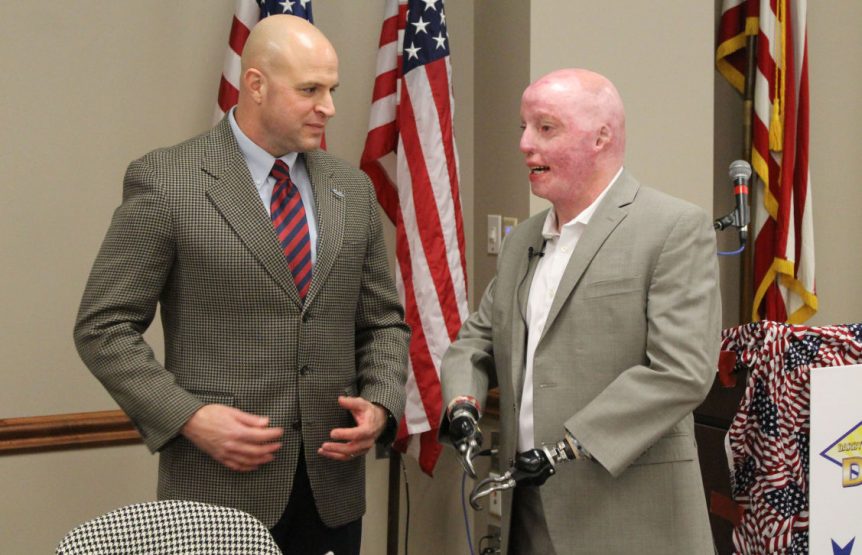Special forces support organization uses duck hunting to help heal wounds

According to retired Army Ranger Michael Schlitz, homelessness, unemployment and suicide rates are at record highs among combat veterans. A Searcy nonprofit organization seeks to change those odds for wounded veterans in the special forces by bringing them together in an Arkansas way -duck hunting.
Darby’s Warrior Support, formerly Operation Wounded Warrior Support, was formally established in 2010 by four U.S. Anny rangers. They sought to provide healing for combat-injured Army rangers through the camaraderie of water fowling.
According to Schlitz, who lost both arms and received burns over nearly his entire body as a result of a roadside bomb in Afghanistan in 2007, current statistics show that 22 veterans commit suicide a day.
“But that’s not taking into consideration that not all agencies report veteran suicide, and not all states report veteran suicide,” Schlitz said. “So, in all likelihood, that number’s probably on the low end.”
“So if we can get them out of that isolation, if we can get them around their brothers and sisters again, if we can build that camaraderie again, if we can build an esprit de corps, what’s the chance that they won’t take their life?” Schlitz said. “If we can get that individual a mentor, a coach, somebody he can call in those times of need, what’s the chance that he won’t become unemployed anymore?
“If we build this network and we reach out to individuals, we can help the veteran community.”
At the Darby’s Warrior Support Benefit Banquet held last week, Schlitz told those in attendance of his firsthand experience of needing and receiving support following his extreme physical injuries sustained in combat.
“There was not one part of my day that I could do by myself,” Schlitz said. “I was absolutely completely dependent on my mother, my caregiver. You know, I couldn’t feed myself, couldn’t dress myself, couldn’t bathe myself, couldn’t take myself to the bathroom. Half the time, I couldn’t even walk.
“So life for me was at my absolute low. You know, I went from a hard-charging ranger, from taking the fight to the enemy to a guy that couldn’t even feed himself. So mentally that took a huge toll on me, and luckily I did have my mother there to help me out, and what I came to find out was I also had my brothers-in-arms. My fellow rangers would come visit me, making sure I was never left alone. They were constantly there to remind me that rangers don’t quit that we always push forward.
“Well, often times, I hear civilians say, ‘Why do these guys go to these events? Why do we need to send a wounded guy to a baseball game? Or why do we need to send him out hunting?” Because most of those individuals, whether you can physically see their injury or they have a psychological injury or a traumatic brain injury, need adjustment back into the civilian world.”
I went from a hard-charging ranger, from taking the fight to the enemy to a guy that couldn’t even feed himself. So mentally that took a huge toll on me, and luckily I did have my mother there to help me out, and what I came to find out was I also had my brothers-in-arms.
– Retired Army Ranger Michael Schlitz
I got to see their mission. I got to see how they’re impacting the rangers’ lives. And I also got to talk to them and see what their plans for the future are, and it’s not just going to stop with the rangers.
– Retired Army Ranger Michael Schlitz
Darby’s Warrior Support takes Army rangers on all-expense-paid duck hunting retreats near Searcy.
“I got to see their mission. I got to see how they’re impacting the rangers’ lives. And I also got to talk to them and see what their plans for the future are, and it’s not just going to stop with the rangers. [They’re] opening it up to special operations,” Schlitz said. “I want to say why that’s important. Everyone who serves this country is important, but then we have the tip of the spear and that’s our special operations soldiers.”
According to Schlitz, the Ranger Regiment, a brigade-sized element comprised of three battalions and a support battalion, is the only element its size in the Army that has been “in conflict or taken the fight to the enemy every single day since 2001.”
“Not one day has the enemy been able to rest because of our Ranger Regiment. That is huge,” he said. “You look at the guys in special forces, every one of them have people taking the fight to the enemy, every single day. If you joined those units, it’s not whether [you] deploy, it’s not whether the enemy finds [you]-you’re taking the fight to them. We need to make sure that those guys get the support.
“And how do we do that? We bring them out to events like this. We bring them out to where they get around their brothers-in-arms who share similar experiences and just have a day.”
Schlitz said Darby’s Warrior Support doesn’t “force the therapy.”
“They just let it happen,” he said. “And I guarantee that probably within the first few hours they feel each other out, get to know each other and on the first night they’re probably already beginning to share with one another.”
According to retired Brig. Gen. Jim Daniel, who helped establish the organization, it seeks to “bring these soldiers in so they can begin to experience healing with one another” and provide educational scholarships through the Ranger Scholarship Association.
“We’ll be around 20 years from now,” Daniel said, “so that when these guys get older, there’ll still be a place for them to come.”
He said the board made the decision to change the organization’s name to avoid confusion with the national Wounded Warrior Project.
“We would get checks made out to the wrong people and [had to] send them back” Daniel said. “So, we need to be who we are in Arkansas and let whoever else nationally be who they are, so that’s basically why.”
The group chose to name the organization in honor of William 0. Darby who founded the Ranger Regiment during World War II.
“He was a ranger among rangers,” Daniel said. “The most distinguishing characteristic about him is he won the Distinguished Service Cross twice. And he went back to Italy by choice, and was killed in Italy because he wanted to be back with the boys. He led from the front in combat. His boys always followed him; He wasn’t back behind them – quite a man, quite a man.”
When asked about the organization’s plans for the future, Daniel said, “Well, I think the thing that to me is the most striking is that Searcy has opened its heart and wrapped its arms around us as an organization. I think there’s no limit now as to what we can do. I really do. I believe that with all my heart.”

